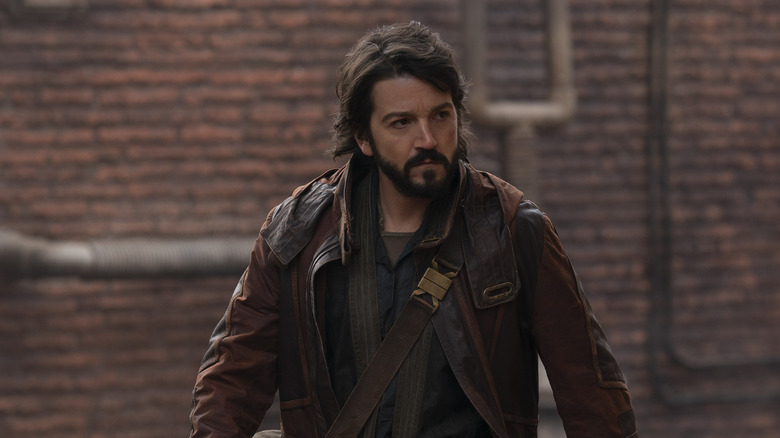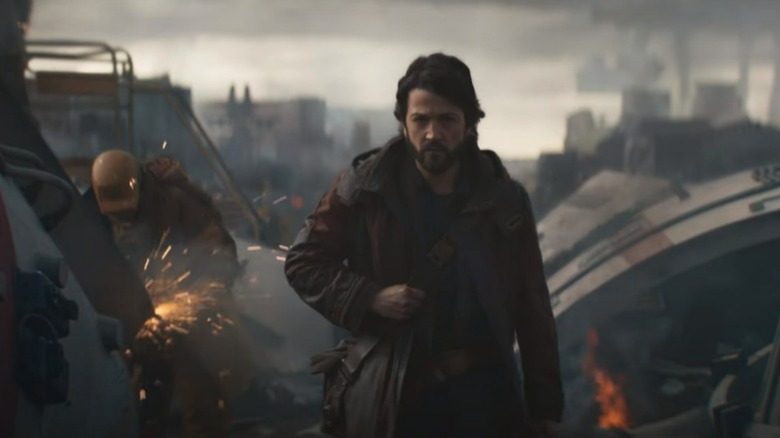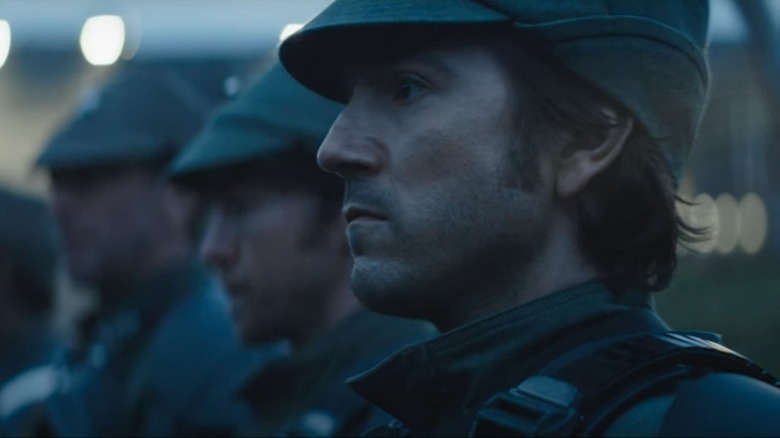Andor Feels Nothing Like Any Previous Star Wars Project – And That's A Good Thing
For as unimaginably large universe as "Star Wars" is — full of potential to host stories with all sorts of different tones, protagonists, and even mediums (as proven by the property's shift away from the big screen and towards Disney+ streaming) — the franchise can't help but bring things back to the famous Skywalker family again and again. In one sense, it feels natural that the characters who started it all in George Lucas' original trilogy would cast a long shadow extending to countless other adventures. On the other hand, isn't there something terribly restrictive about viewing the entire franchise through a Skywalker filter?
When "Rogue One: A Star Wars Story" came to theaters back in 2016, everything from its gritty aesthetic to its war movie ambitions to its "disposable" group of scrappy main characters signaled a major shift in approach. The execution of director Gareth Edwards' distinctive vision ended up taking a slightly different direction during reshoots, turning the final result into something much more familiar and palatable to a broader audience. But little did anyone involved realize at the time how the foundation it built would eventually lead to a show like "Andor."
Riding a wave of anticipation, the Diego Luna-starring series has arrived to pay off on such promise with its downright bold three-episode premiere. Finally, here's a project that instantly feels unique and separate from the pervasive influence of the franchise's royal family. Although there have been previously successful attempts to achieve similar results, "Andor" feels like the beginning of a very different sort of "Star Wars" story — one that stands out on the strength of its own storytelling, rather than existing to merely blend in.
General spoilers for "Andor" follow!
Keeping it simple
Of all the ways to revolutionize an arguably stagnant franchise, the refreshing feeling of "Andor" mostly comes down to the simplest possible answer — it treats its main plot as an actual story worth telling. Who knew!
The franchise's tendency to create new installments almost solely for the purpose of being fed through the IP meatgrinder has become prevalent enough to inspire its own mocking meme, but thankfully that's where "Andor" comes in. Few would've ever expected that a prequel series to a prequel/spin-off movie of its own would act as a stark rebuttal to this tiresome trend, but that's simply the by-product of narratives that are prioritized as character-first, not cameo-first. Not surprisingly, creator Tony Gilroy (the "Bourne" trilogy, "Michael Clayton") infuses a more grown-up and narratively satisfying mentality right from the start.
When we catch up with Diego Luna's Cassian Andor in the beginning moments of "Andor," it's apparent that he has a long, long path ahead of him to become the (slightly) more heroic character we meet in "Rogue One." His shocking act of brutality that ends with one attacker dead and the other mercilessly executed sets the tone for the rest of the premiere, taking viewers through a street-level journey that remains entirely focused on Cassian's specific arc. No cross-branding exercises or characters practically designed to go viral distract from the show's mission statement.
The fact that some have spun this as a failure of the series, as incredible as that is to believe, speaks to how desperately a show like "Andor" — simple, straightforward ambitions and all — has been needed.
What's the rush?
Early reactions to "Andor" painted a picture of an ambitious, mature, but ultimately slow first few episodes that helps explain why Disney decided to drop three at once. But for those looking for a change of pace, those first two slow-burn episodes finally give viewers an opportunity to soak in this world from a fresh perspective that we've hardly been able to enjoy before.
"The Mandalorian," as popular as it obviously is, has frenetically jumped from planet to planet in Din Djarin's seemingly never-ending quest to hunt for bounties, take care of his adopted son, and achieve a sense of redemption. "Boba Fett" mostly took place on the desert world of Tatooine, granted, but did we ever truly get any new insights on this planet in the show's obsessive attempts to fit in as many cameos and references as possible? "Obi-Wan Kenobi" perhaps best exemplified the ability to fit a new story within the boundaries of a well-known one, but the final result couldn't help but feel somewhat ... perfunctory.
"Andor" avoids all of these obstacles by allowing Cassian to focus on the mundane and everyday troubles that too few other projects in the franchise have the time and space for. Thus far, his childhood flashbacks have focused on a single tribe of indigenous kids encountering a single starship. The grown-up character's biggest concern revolves around finding a way off his new backwater home planet through smuggling and underhanded deals. And most amusingly of all, the biggest antagonist of the entire series isn't even some Jedi-hunting Inquisitor or Sith lord — essentially, the villains stand in as embodiments of bureaucracy.
"Andor" may very well reveal bigger threats and more expansive storylines to come, but right now the show thrives on its slow, methodical, and impressively restrained approach to telling an essential story in a galaxy far, far away.
New episodes of "Andor" air on Disney+ every Wednesday.


